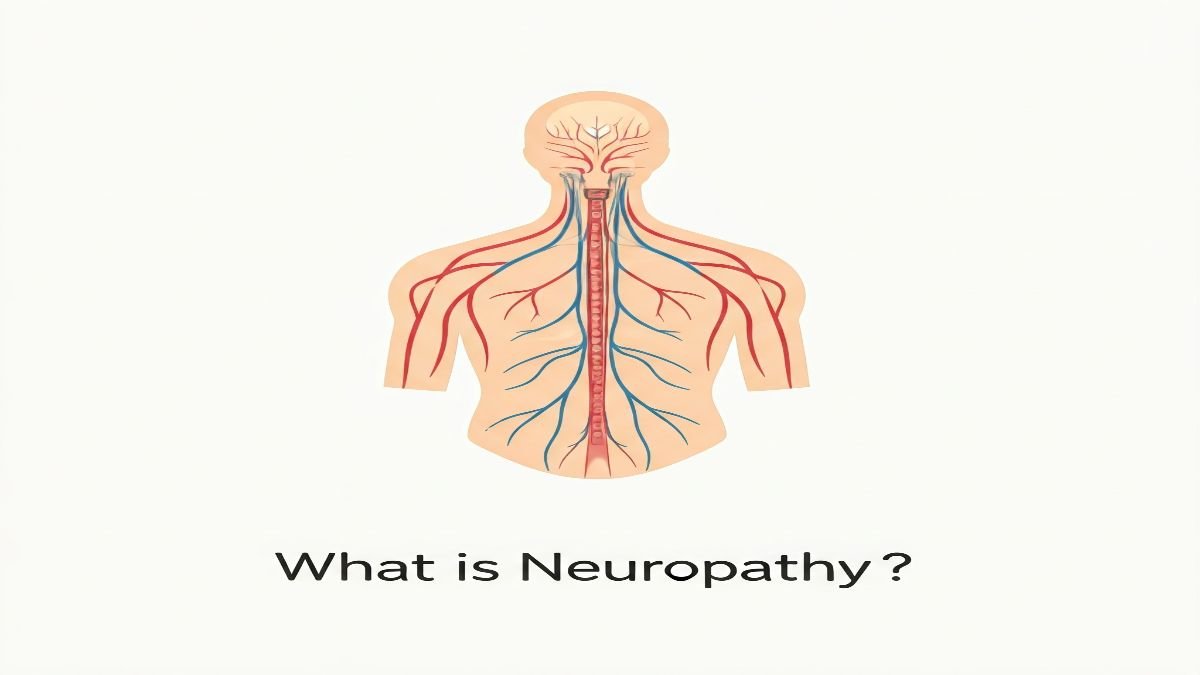Overview
Neuropathy, commonly referred to as peripheral neuropathy, is a condition that occurs due to damage to the peripheral nervous system—the network of nerves outside the brain and spinal cord.
This condition can disrupt communication between the brain, spinal cord, and the rest of the body, leading to a range of symptoms.
Neuropathy can result from various underlying causes such as diabetes, injuries, infections, or even genetic disorders. The symptoms vary depending on the type of nerves affected—sensory, motor, or autonomic.
Early detection, proper treatment, and lifestyle changes can help manage the condition and prevent complications.
Table of Contents
What is Neuropathy?
Neuropathy refers to nerve damage or dysfunction that affects the peripheral nervous system. Depending on the nerves affected, neuropathy can impair sensation, movement, and organ function.
The condition may be classified based on its scope and cause:
- Mononeuropathy: Damage to a single nerve (e.g., carpal tunnel syndrome).
- Polyneuropathy: Damage to multiple nerves, often seen in diabetes.
- Autonomic Neuropathy: Affects involuntary functions like heart rate and digestion.
Types of Neuropathy
Neuropathy is classified based on the types of nerves involved:
- Peripheral Neuropathy: Affects nerves in the hands, feet, and limbs.
- Autonomic Neuropathy: Damages nerves controlling involuntary functions like heartbeat and digestion.
- Cranial Neuropathy: Impacts cranial nerves, affecting vision, hearing, or facial muscles.
- Focal Neuropathy: Sudden, isolated nerve damage causing specific symptoms like eye pain or limb weakness.
Symptoms of Neuropathy
The symptoms of neuropathy vary based on the nerves affected.
Sensory Nerve Damage
- Tingling or numbness in the hands and feet
- Burning or sharp, stabbing pain
- Reduced ability to feel temperature changes
- Heightened sensitivity to touch
Motor Nerve Damage
- Muscle weakness or cramping
- Difficulty walking or maintaining balance
- Paralysis in severe cases
Autonomic Nerve Damage
- Excessive sweating or inability to sweat
- Digestive problems like constipation or diarrhea
- Dizziness or fainting due to low blood pressure
- Bladder or bowel dysfunction
Causes of Neuropathy
Neuropathy arises from various factors, which may include:
- Diabetes: High blood sugar damages nerves over time, making diabetic neuropathy one of the most common forms.
- Injuries: Physical trauma or repetitive stress injuries can compress or sever nerves.
- Infections: Viral or bacterial infections like shingles, Lyme disease, or HIV can damage nerves.
- Autoimmune Disorders: Conditions like lupus or rheumatoid arthritis may attack the nerves.
- Nutritional Deficiencies: Lack of vitamin B1, B6, B12, or E can lead to nerve damage.
- Toxins: Exposure to heavy metals, alcohol abuse, or certain chemotherapy drugs can harm nerves.
- Inherited Disorders: Genetic conditions like Charcot-Marie-Tooth disease affect nerve function.
Risk Factors for Neuropathy
Several factors increase the likelihood of developing neuropathy, including:
- Chronic Diseases: Diabetes, kidney disease, or hypothyroidism.
- Age: Older adults are at higher risk.
- Lifestyle Choices: Alcoholism or a poor diet lacking essential vitamins.
- Medications: Chemotherapy drugs or prolonged use of certain antibiotics.
- Family History: Genetic predisposition to neuropathy.
Complications of Neuropathy
Neuropathy complications include:
- Foot ulcers: Leading to infections and potential amputation.
- Autonomic problems: Affecting heart rate, blood pressure, digestion, and bladder function.
- Muscle weakness/atrophy: Difficulty moving and balance issues.
- Charcot foot: Bone and joint deformities, often in the feet.
- Falls/fractures: Increased risk due to loss of sensation and balance.
- Pain: Burning, tingling, shooting, or stabbing pain.
- Sleep disturbances: Interrupted sleep due to pain and other symptoms.
- Depression/anxiety: Mental health impacts due to the challenges of living with neuropathy.
Diagnosis of Neuropathy
Diagnosing neuropathy involves a combination of medical history, physical exams, and diagnostic tests:
- Medical History: Review of symptoms, lifestyle, and underlying health conditions.
- Neurological Examination: Assessment of reflexes, muscle strength, and sensory function.
- Blood Tests: Check for diabetes, vitamin deficiencies, or thyroid disorders.
- Electromyography (EMG): Measures electrical activity in muscles to detect nerve damage.
- Nerve Conduction Studies: Evaluate the speed and strength of electrical signals in nerves.
- Imaging Tests: MRI or CT scans may be used to identify nerve compression or injuries.
- Nerve Biopsy: Rarely performed, it involves analyzing a small nerve sample.
Treatment for Neuropathy
The treatment of neuropathy depends on its underlying cause and severity. The primary goals are symptom relief, managing the cause, and preventing further damage.
Lifestyle Changes
- Healthy Diet: A balanced diet rich in vitamins B1, B6, B12, and E supports nerve health.
- Regular Exercise: Physical activity improves blood flow to the nerves.
- Smoking Cessation: Avoid smoking to enhance circulation.
- Avoiding Alcohol: Reduce alcohol consumption to prevent nerve toxicity.
Medications
- Pain Relievers: Over-the-counter or prescription drugs for pain management.
- Anticonvulsants: Medications like gabapentin or pregabalin reduce nerve pain.
- Antidepressants: Tricyclic antidepressants and SSRIs help alleviate chronic pain.
- Topical Treatments: Capsaicin cream or lidocaine patches for localized pain relief.
Targeted Therapies
- Physical Therapy: Strengthens muscles and improves mobility.
- Occupational Therapy: Helps patients adapt to daily activities.
- Transcutaneous Electrical Nerve Stimulation (TENS): Uses electrical impulses to reduce pain.
Surgical Interventions
- For conditions like carpal tunnel syndrome, surgery may be necessary to relieve nerve compression.
Prevention of Neuropathy
Preventing neuropathy focuses on addressing modifiable risk factors:
- Manage Chronic Conditions: Control blood sugar, blood pressure, and cholesterol levels.
- Adopt a Healthy Lifestyle: Eat a balanced diet with adequate vitamins and minerals. Exercise regularly to promote nerve and overall health.
- Avoid Toxins: Limit exposure to heavy metals and harmful chemicals.
- Avoid Alcohol Intake: Avoid alcohol consumption to prevent this disease.
- Protect Nerves: Use safety measures to avoid injuries that could damage nerves.
Conclusion
Neuropathy is a challenging condition that can significantly impact quality of life if left untreated.
However, early detection, targeted treatment, and lifestyle adjustments can help manage symptoms and slow the disease’s progression.
By addressing risk factors and making proactive changes, individuals can reduce their likelihood of developing neuropathy and maintain optimal nerve health.
Regular medical checkups are essential for monitoring and managing underlying causes like diabetes or vitamin deficiencies.
FAQs on Neuropathy
1. What causes neuropathy?
Neuropathy is caused by various factors, including diabetes, injuries, infections, nutritional deficiencies, and exposure to toxins.
2. Can neuropathy be cured?
While neuropathy cannot always be cured, treatment can manage symptoms and prevent further nerve damage.
3. What are the symptoms of neuropathy?
Symptoms include tingling, numbness, burning pain, muscle weakness, and autonomic issues like digestive or bladder problems.
4. How is neuropathy diagnosed?
Neuropathy is diagnosed using physical exams, blood tests, nerve conduction studies, and imaging tests.
5. Is neuropathy life-threatening?
While not typically life-threatening, neuropathy can lead to severe complications if left untreated, especially in cases like autonomic or diabetic neuropathy.

